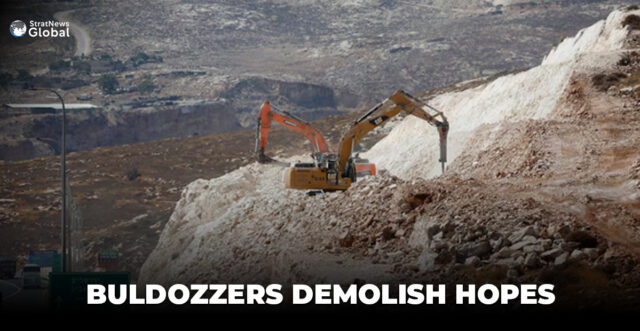As U.S. President Donald Trump unveiled a plan to end the Gaza war and floated a path to Palestinian statehood, Ashraf Samara watched bulldozers near his West Bank village erase his hopes for the future.
Surrounded by armed security guards, the Israeli machinery shoved aside earth to create new routes for Jewish settlements, carving up the land around Samara’s village of Beit Ur al-Fauqa and creating new barriers to movement for Palestinians.
“This is to prevent the residents from reaching and using this land,” said Samara, a member of his village council.
He told Reuters the move would “trap the villages and the residential communities” by confining them exclusively to the areas they live in.
With each new road that makes movement for Jewish settlers easier, Palestinians in the West Bank who are usually barred from using the routes face fresh hurdles in reaching nearby towns, workplaces or agricultural land.
More Nations Recognise Palestinian State
While several major European countries, including Britain and France, in September joined an expanding list of nations recognising a Palestinian state, Israeli settlements on the West Bank have been expanding at an increasingly rapid pace under Prime Minister Netanyahu’s government as the Gaza war has raged.
Palestinians and most nations regard settlements as illegal under international law. Israel disputes this.
Hagit Ofran, a member of the Israeli activist group Peace Now, said new roads being bulldozed around Beit Ur al-Fauqa and beyond were a bid by Israel to control more Palestinian land.
“They are doing it in order to set facts on the ground. As much as they have the power, they will spend the money,” she said, adding that Israel had allocated seven billion shekels ($2.11 billion) to build roads in the West Bank since the October 2023 Hamas attacks that sparked Israel’s war in Gaza.
Israeli settlements, which have grown in size and number since Israel captured the West Bank in the 1967 war, stretch deep into the territory, backed by a system of roads and other infrastructure under Israeli control.
Israeli rights group B’Tselem, in a 2004 report, described this network of roads and bypasses to settlements built over several decades as “Israel’s Discriminatory Road Regime”. The group said some roads were aimed at placing a physical barrier to stifle Palestinian urban development.
Netanyahu’s office and the Israeli military did not immediately respond to requests for comment. The Yesha Council, a body that represents West Bank settlers, also did not immediately reply to a request for comment.
Before Trump’s Gaza plan was announced, Netanyahu declared: “There will never be a Palestinian state”, speaking as he approved a project last month to expand construction between the West Bank settlement of Maale Adumim and Jerusalem.
His finance minister, Bezalel Smotrich, said of the same project that it would “bury” the idea of a Palestinian state.
Trump’s Gaza plan to end the war, which Netanyahu approved, outlines a potential pathway to Palestinian statehood, but the conditions it lays down to achieve that mean such an outcome is far from guaranteed, analysts say.
“What the government is now doing is setting the infrastructure for the million settlers that they want to attract to the West Bank,” Ofran said. “Without roads, they cannot do it. If you have a road, eventually, almost naturally, the settlers will come.”
(With inputs from Reuters)





